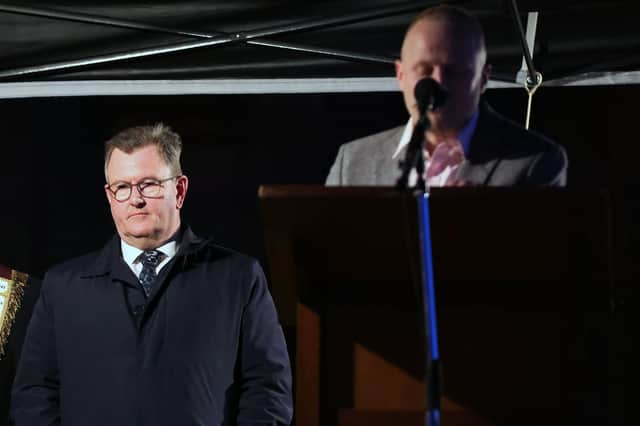Jamie Bryson: If unionism accepts an Irish Sea border, then it will accept anything


However, it is unfortunate that I now find myself increasingly driven to the conclusion that having come this far, Sir Jeffrey is about to do a deal which betrays all the fundamental commitments made.
It is all the harder to fathom the reasons for this when Sir Jeffrey is under no serious internal pressure within the unionist family.
Advertisement
Hide AdAdvertisement
Hide AdIn every single poll, a large majority support the DUP’s stance - and have indicated that they are willing to remain out of Stormont forever, if necessary, in a principled refusal to accept the Irish Sea border.


A sub-optimal deal will fundamentally fracture and split unionism.
There will be pragmatists who will be willing to accept the defeat, but the deflation to the unionist psyche that comes with it will leave a lasting scar.
On the other hand, there will be others, like me, who will have seared on our collective soul the injustice not only of the Irish Sea border, but of the feeling of having been betrayed by those with whom we stood side by side.
Advertisement
Hide AdAdvertisement
Hide AdThose who have refused to accept the Irish Sea border will not go quietly.
We will fight on, using every lawful and political tool available to impede, frustrate and destabilise the implementation of the Irish Sea border even if, sadly, it is our own friends who are the implementers.
How could we do anything otherwise after coming this far?
I trust that those in the DUP who have valiantly stood like Horatio at the bridge trying to hold the line will, if Sir Jeffrey forces through his deal, continue to fight on until such times as we achieve our stated objective.
The sadness of all of that is that it could well tear unionism apart, turning friend against friend.
Advertisement
Hide AdAdvertisement
Hide AdThat would be a brutal internal unionist battle, and it would take a long time to heal, if there were ever healing at all.
It is worth pointing out to Sir Jeffrey that it is not the likes of myself or Jim Allister who changed, we have remained consistent from the very outset.
Sir Jeffrey described the protocol as being “not a constitutional issue”, and somewhat extraordinarily given his latter (welcome) conversion to anti-protocol unionism, as containing “opportunities”.
That Sir Jeffrey, and the DUP corporately, abandoned the position of being protocol accepters and implementers and instead adopted our political arguments was of course welcome.
Advertisement
Hide AdAdvertisement
Hide AdHowever, having undergone that conversion, it requires an agility of principles (to put it mildly) in order to then revert back to the position of 2021.
In his speech in the House of Commons this week, Sir Jeffrey lambasted those who would say “imperfect direct rule” is better than “imperfect devolution”.
The seeming justification for this was that we consistently point to the government having betrayed us, therefore - I presume - the argument is that direct rule means handing power to such a government.
That point could be made good if Sir Jeffrey could demonstrate how devolution is a safeguard against such negative actions of successive governments, but in reality that is the fatal flaw in this argument.
Advertisement
Hide AdAdvertisement
Hide AdWhilst it is true to say that in theory devolution contains safeguards, we have nevertheless seen time and time again the government simply override them, whether that be on Irish language or, most fundamentally, the disapplying cross community consent to deliver the imposition of the protocol.
Therefore, Sir Jeffrey cannot, with any credibility, say that devolution provides safeguards against the type of government betrayals we have raged against. It demonstrably does not.
In unionism there will be many people who feel that having a devolved institution is necessary for the long-term preservation of the Union, and that that is the overriding issue.
But the logic of that is that in order to have such devolution, you must be willing to pay the price of accepting and implementing the Irish Sea border.
Advertisement
Hide AdAdvertisement
Hide AdAnd if unionism is willing to pay that price, what price wouldn’t be paid?
This is where the practical and pragmatic approach collides with fundamental principle.
If unionism accepts this - in the name of pragmatism - then the message sent out is that unionism will, when it comes to it, accept anything.
It would be foolish to think that the “process” won’t continue to therefore extract more and more, knowing that unionism will never truly resist.
Advertisement
Hide AdAdvertisement
Hide AdI recall one of the largest anti-protocol rallies, at Brownlow House in Lurgan. I marched along with, and stood side by side with, Sir Jeffrey Donaldson, and was proud to do so.
From our elevated position on the stage we were able to look down at vast numbers of unionists and loyalists from all different social and community backgrounds; all standing together more united than I ever remember.
If Sir Jeffrey casts his mind back, he will, I have no doubt, recall the image in his mind’s eye.
That gathering is representative of the people who gave the DUP the mandate; that is our community; that is the people to whom Sir Jeffrey made fundamental promises, and who - in turn - cheered him through the streets with cries of “stand firm Jeffrey” and “don’t give in Jeffrey”.
Advertisement
Hide AdAdvertisement
Hide AdIf I had some magical ability to transport back to that moment in Lurgan, to stand once again beside Sir Jeffrey, I would contrast that moment of unionism and loyalism standing in unity, united behind him as the leader of unionism, with the envisaged smug applause and plaudits from those who represent an establishment and Irish nationalism, which deep down disdains everything we stand for, but who will mockingly lavish praise upon any unionist who is willing to implement the Irish Sea border.
I would then ask Jeffrey, “for whom are you doing it?”.
Jamie Bryson is chair of Unionist Voice Policy Studies and NI director for Centre for the Union